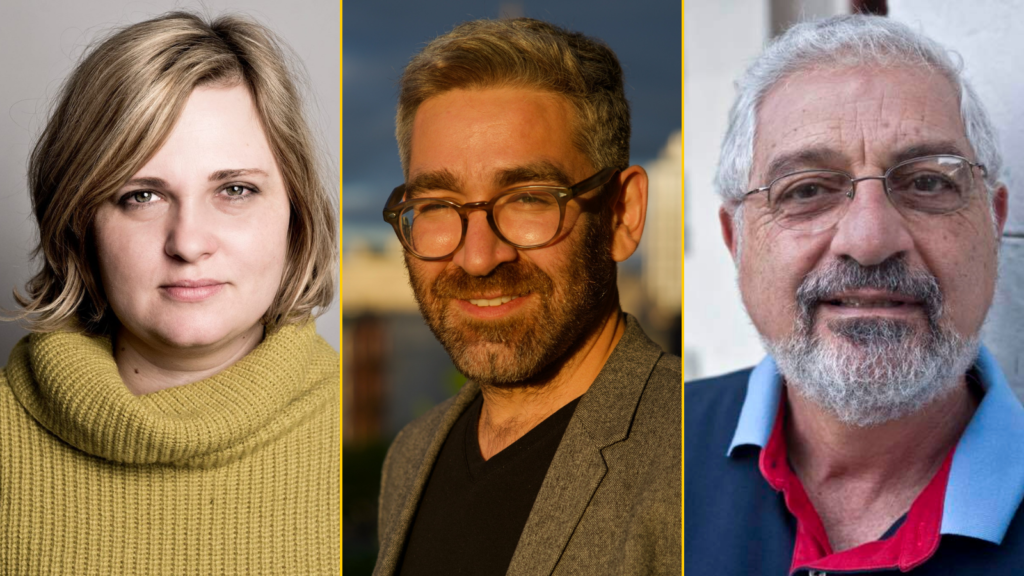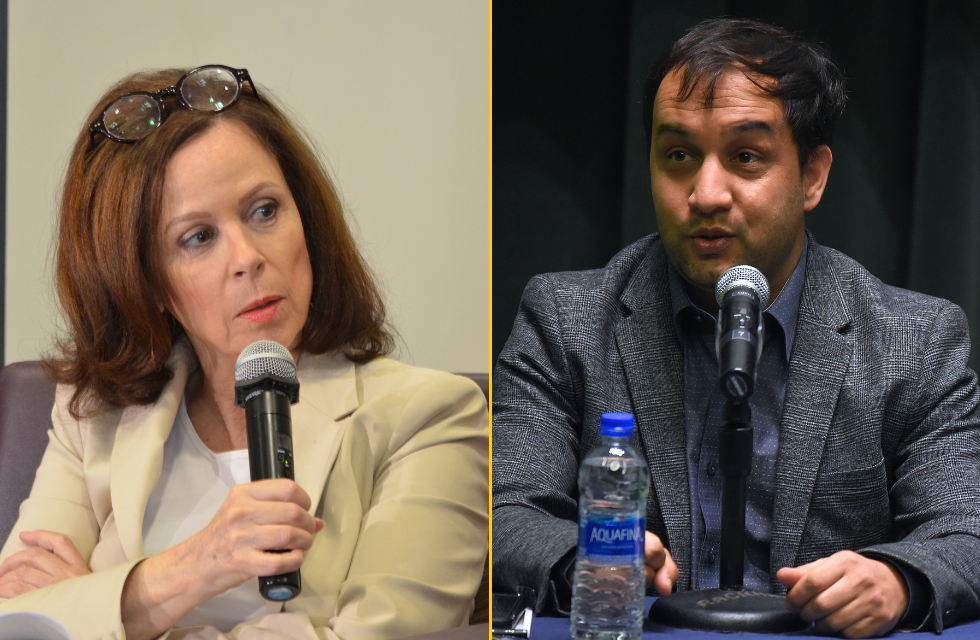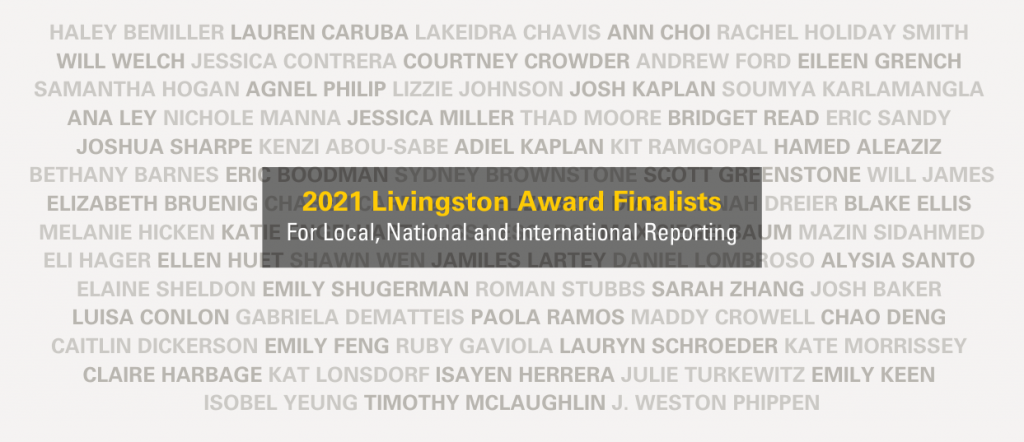
Wallace House teamed with partners across campus to bring conversations into the public spaces – both virtual and in-person. Thank you for joining us.
Wallace House Presents the Eisendrath Symposium with Elena Milashina, Simon Ostrovsky and Ronald Suny
Devastation in Ukraine and the Consequences of Engagement
April 18, Noon ET
While the Russian invasion of Ukraine swiftly united NATO and western nations in condemning Putin, enacting sanctions and supplying defense weapons, there are growing cries for the U.S. and its NATO allies to do more militarily. Join Knight-Wallace journalists who have reported extensively from the region and a U-M policy expert as they examine Putin’s suppression of a free press, the call for direct military support, and the geopolitical, economic and humanitarian consequences of the growing conflict.
Elena Milashina is an award-winning senior investigative reporter for Novaya Gazeta, the acclaimed independent Russian news organization that recently ceased publication in response to threats of closure and imprisonment from the Putin regime. Simon Ostrovsky is a video journalist and filmmaker who reports for PBS NewsHour and The New York Times. Ronald Suny is a professor of history and political science at U-M and a senior researcher at the National Research University-Higher School of Economics in Saint Petersburg, Russia.
Wallace House Director, Lynette Clemetson, will lead this discussion.
The Eisendrath Symposium on International Reporting honors Charles R. Eisendrath, former director of Wallace House, and his lifelong commitment to international journalism.
The Knight Foundation, Ronald and Eileen Weiser Center for Europe and Eurasia (WCEE), Center for Russian, East European, and Eurasian Studies (CREES), Gerald R. Ford School of Public Policy and Michigan Radio are co-sponsors of this event.
Democracy in Crisis: Views from the Press
A special series featuring Molly Ball, Barton Gellman, Sarah Kendzior and Anne Applebaum
U.S. democratic institutions are under attack. While law enforcement agencies and a Congressional committee still work to investigate the January 6, 2021, attacks on the Capitol – political violence aimed at blocking or overturning the results of the 2020 presidential election – a wave of subsequent efforts have continued to seek to undermine the norms and structures that have given Americans basic confidence in elections and in the peaceful transfer of power. Meanwhile, from statehouses to the Supreme Court, bitter debates rage over voting rights, access, and security.
The series will also explore the current state of journalism and the role of the press in upholding democratic institutions–at a time of demagogic attacks on the media and dramatic shifts in media ownership and independence.
March 9: Molly Ball, “Democracy: What It Takes”
March 23: Barton Gellman, “Democracy in Crisis” Virtual event
March 31: Sarah Kendzior, “Hiding in Plain Sight” Virtual event
April 4: Anne Applebaum, “Democracy in Crisis: The Twilight of Democracy” In-person event
This speaker series is hosted by the Gerald R. Ford School of Public Policy. Co-sponsored by Democracy & Debate, Wallace House, Gerald R. Ford Library and Museum, and Gerald R. Ford Presidential Foundation.
America’s Place in the Post-Afghanistan World
With Robin Wright, writer for The New Yorker and Jawad Sukhanyar, journalist and 2019 Knight-Wallace Fellow
4 p.m. ET | Wednesday, October 27
What are the implications of the U.S. retreat from Afghanistan? Does it mark the “end of the American era?” What can the world community do for the thousands of Afghan refugees across the globe? How will the Taliban government treat women and Afghans who worked with Western organizations? Amid the continuing uncertainty, journalists Robin Wright and Jawad Sukhanyar will give their perspectives on the evolving situation, in conversation with Lynette Clemetson, Director of Wallace House.
Robin Wright has written for The New Yorker since 1988 as a contributing writer and columnist. Her first piece on Iran won the National Magazine Award for best reporting. A former correspondent for The Washington Post, CBS News, the Los Angeles Times, and The Sunday Times, she has reported from more than 140 countries. Wright is the author of several books. Her book, “Rock the Casbah: Rage and Rebellion Across the Islamic World,” was selected as the best book on international affairs by the Overseas Press Club.
She received her bachelor of arts and masters’ degrees from the University of Michigan and was the first female sports editor for The Michigan Daily.
Jawad Sukhanyar, journalist and 2019 Knight-Wallace Fellow, was a reporter for The New York Times in Afghanistan from 2011 to 2019. He returned to Ann Arbor to join the university as a journalist-in-residence with the Donia Human Rights Center and the International Institute. This research fellowship, sponsored by Wallace House, will commence once Sukhanyar receives full clearance from U.S. resettlement and immigration officials. He will study the implication of the U.S. departure from Afghanistan and new rule under the Taliban.
Sukhanyar first came to the university in September 2018 as a Knight-Wallace Fellow, where he studied issues related to women’s rights in Afghanistan. Read more about Sukhanyar’s journey.
This Policy Talks @ the Ford School event is co-sponsored by Wallace House and the Donia Human Rights Center.
Covering 9/11: How the attacks shaped our world today
With Beth Fertig and Aisha Sultan
4 p.m. ET | September 9, 2021
It’s been 20 years since the attacks of September 11, 2001, and the world we live in is still shaped in many ways by the events of that day. Join the Ford School and Wallace House for a special retrospective on 9/11 with journalists Beth Fertig of WNYC and Aisha Sultan, a nationally syndicated columnist, who has written about the U.S. Muslim experience, in a post-9/11, post-Trump America. Lynette Clemetson, Director of Wallace House, will moderate the conversation.
Beth Fertig is a senior reporter at WNYC. She is currently covering New York City’s economic recovery from the pandemic. Since starting her career at WNYC in 1995, she has reported on immigration, public education, 9/11, and city politics. She has won many local and national awards.
Fertig is a New York City native who discovered her love for journalism at The Michigan Daily, her college newspaper at the University of Michigan. She also has a Master’s degree in Social Sciences from the University of Chicago. She is a frequent contributor to National Public Radio.
Aisha Sultan is a nationally syndicated columnist and award-winning filmmaker and features writer. Her work has run in more than a hundred publications. She has won several national honors, including the Asian American Journalists Association “Excellence in Written Journalism” award for her coverage of the unrest in Ferguson, Missouri. Her work explores social change with an emphasis on education, families and inequality. Sultan teaches college writing at Washington University. Her essay on being a Muslim in this country during 9/11 and the ensuing 20 years was published in the September 1, 2021 issue of Newsweek.
This conversation will be moderated by Lynette Clemetson, Director of Wallace House.
This event is a Josh Rosenthal Education Fund Lecture and part of the Policy Talks at The Ford School event series, co-sponsored by Wallace House.












